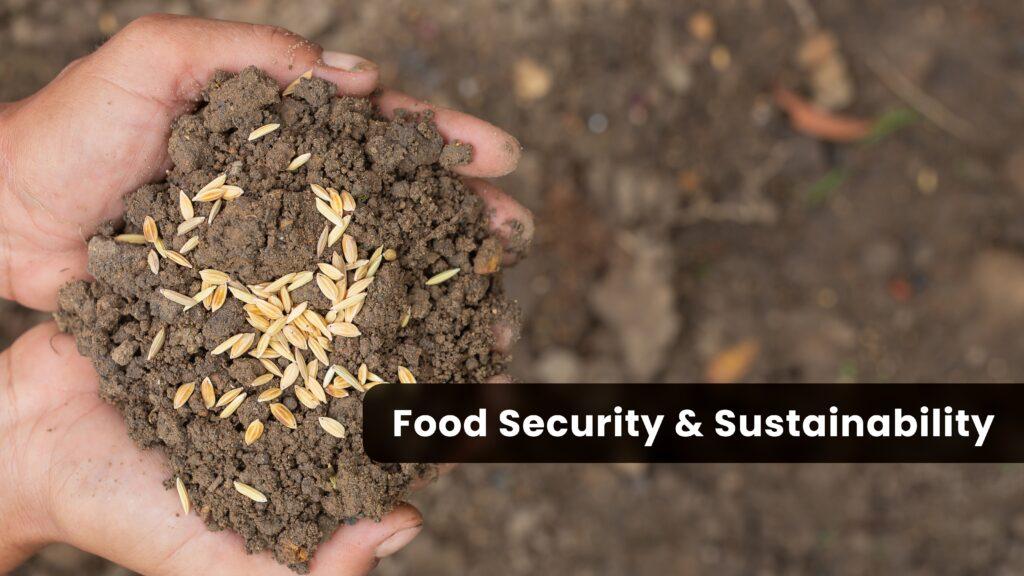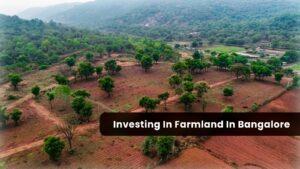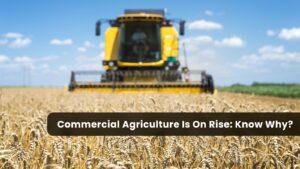Agriculture holds immense significance due to its fundamental role in supporting the well-being of individuals, societies, and the global ecosystem. It serves as the primary source of food production, ensuring a sufficient and nourishing food supply for the world’s population. Furthermore, agriculture has the potential to actively promote environmental sustainability, acting as a valuable ally in preserving the environment and reducing our ecological footprint.
Now, let’s explore the various ways in which agricultural lands contribute to both food security and sustainability.
Production of Food
A vast variety of crops, including grains (such wheat, rice, and corn), oilseeds, fruits, vegetables, and legumes, are grown in agricultural lands. Lands used for agriculture are essential for guaranteeing food security. They contribute to meeting the dietary demands of local, regional, and international populations by generating an abundance and variety of food. For the purpose of maintaining food supplies and reducing reliance on imports, access to rich agricultural regions is crucial. Additionally, it facilitates the production of a wide range of crops. The achievement of a balanced and nutrient-rich diet depends on this diversity. A varied agricultural system helps mitigate sensitivity to pests and crop failures by producing a variety of crops that each provide critical nutrients.
Employment and Livelihood
An enormous majority of the world’s population works directly in agriculture, which is a labor-intensive industry. Rural areas frequently contain agricultural lands, which are the foundation of the rural economy. Since agriculture provides a variety of options outside of farming, such as food processing, storage, marketing, transportation, and agricultural services, many rural populations significantly rely on it for their livelihoods. Food security for both rural and urban people is ensured by its major contribution to food production. In addition to traditional farming, people can start enterprises in the fields of agro-processing, agri-tourism, organic farming, agricultural technology, and more, which will help them, and others find work. Through direct farming operations, value chain employment, entrepreneurial endeavors, and their substantial contributions to food security and economic growth, agricultural lands offer employment and livelihood options. To improve the wellbeing of people and communities who depend on agricultural lands, it is essential to support and invest in sustainable agriculture.
Conserving Biodiversity
Through the use of agroforestry techniques, trees can be integrated into agricultural lands to improve biodiversity. Birds, insects, and other species can find homes in trees, while their roots enhance soil quality and reduce erosion. Conservation tillage, crop rotation, and cover crops are examples of sustainable farming practices that support soil health, prevent erosion, and enhance water quality. Natural pest management techniques are encouraged, and synthetic chemical use is reduced through the use of organic farming practices. Organic farms offer a safer environment for pollinators, beneficial insects, and other wildlife, aiding biodiversity conservation by avoiding the use of pesticides and fostering ecological balance. A platform for educating people and spreading awareness about biodiversity preservation can be found on agricultural fields. Farmers may encourage the adoption of sustainable farming practices that support biodiversity by sharing their experiences, practices, and success stories.
Management of Water
Since it directly influences crop productivity, soil health, and the sustainable use of water resources, water management is an essential component of agricultural fields. Irrigation is frequently needed on agricultural land to supplement rainfall and ensure crops have enough water. Water is delivered directly to plant roots using efficient irrigation systems, including drip irrigation or precision sprinklers, which minimize runoff and evaporation. For agricultural regions, effective drainage systems are essential to preventing waterlogging and soil erosion. Drainage systems that are properly planned can effectively remove extra water from fields, ensuring ideal soil moisture levels and avoiding crop damage. An important part of managing water for agricultural fields is played by governments and regulatory authorities. Agriculture can benefit from efficient water management by adopting policies and laws that encourage sustainable water use, offer incentives for water-saving behaviors, and address water allocation and rights.
Climate Change and Mitigation
Through a variety of techniques, agricultural areas have the ability to absorb carbon dioxide from the atmosphere. Techniques like conservation tillage, cover crops, crop rotation, and the addition of organic matter are used in soil carbon sequestration, sometimes referred to as soil sequestration. By lowering greenhouse gas emissions, these practices improve soil health and boost the soil’s capacity to store carbon. Agroforestry systems and afforestation, which include planting trees on agricultural fields, can both help to mitigate climate change. By sequestering carbon dioxide through photosynthesis, trees assist in lowering the atmospheric concentration of greenhouse gases. Additional advantages of agroforestry systems, which combine trees with crops or livestock, include increased soil quality, biodiversity preservation, and diverse revenue sources for farmers. Agricultural lands may greatly contribute to the mitigation of global climate change while guaranteeing food security and the sustainability of agricultural systems by implementing sustainable farming practices, encouraging carbon sequestration, and employing climate-resilient techniques.
By embracing sustainable practices and approaches on agricultural lands, we can enhance food security, protect natural resources, mitigate climate change, and foster long-term sustainability in our agricultural systems.
Our company, Mogg’s Estates, manages farms in Bangalore and is committed to using sustainable practices and methods on agricultural lands. As such, practices can promote long-term sustainability in our agricultural systems, safeguard natural resources, lessen climate change, and improve food security. To know more contact us on 9513655556.



